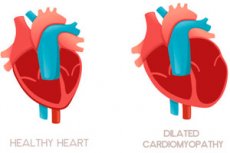New publications
New genetic explanation for heart disease discovered
Last reviewed: 02.07.2025

All iLive content is medically reviewed or fact checked to ensure as much factual accuracy as possible.
We have strict sourcing guidelines and only link to reputable media sites, academic research institutions and, whenever possible, medically peer reviewed studies. Note that the numbers in parentheses ([1], [2], etc.) are clickable links to these studies.
If you feel that any of our content is inaccurate, out-of-date, or otherwise questionable, please select it and press Ctrl + Enter.

A new study published in the journal Nature Genetics and led by scientists from University College London (UCL), Imperial College London and the MRC Laboratory of Medical Sciences has found that dilated cardiomyopathy (DCM) may be caused by the combined effects of hundreds or thousands of genes, rather than a single 'faulty' genetic mutation as previously thought.
What is dilated cardiomyopathy?
DCM is a condition where the heart becomes enlarged and weakened, reducing its ability to pump blood effectively. It affects up to 260,000 people (1 in 250) in the UK and is the leading cause of heart transplants.
DCM was previously thought to be caused by defective copies of a single gene that are passed down through families. However, more than half of patients do not have this genetic mutation.
Key findings of the study
Cumulative influence of genes:
- About a quarter to a third of the risk of developing DCM can be explained by small effects of many genetic differences distributed throughout the genome.
- This points to similarities between DCM and more common diseases such as coronary heart disease, where multiple genes collectively influence risk.
Polygenic risk:
- Scientists have developed a polygenic risk score to estimate the likelihood of developing DCM based on the combined effect of many genes.
- People with the highest polygenic risk (top 1%) have a four-fold higher risk of developing DCM than people with average risk.
Risk in the presence of mutations:
- In patients with rare mutations, the risk of developing the disease increases to 7.3% (compared to 1.7% in patients with low polygenic risk).
Discovery of new genes:
- Eighty genomic regions and 62 genes associated with DCM were identified, most of which had not been previously described.
Practical application of the results
Improved diagnostics:
- Polygenic risk scores may help physicians more accurately predict disease risk in patients and their families.
- This is especially useful for those whose disease is caused by the combined effects of genes rather than a single mutation.
Identification of high risk groups:
- Patients with a high polygenic risk may be monitored more closely and have access to clinical trials of preventive treatments.
Potential new drugs:
- Studying genes associated with DCM could shed light on the biological processes underlying the disease and help develop new treatments.
Researchers' comments
Dr Tom Lambours (UCL):
"Our findings change the understanding of the genetics of DCM: the disease is not caused by a single mutation but by the interaction of many genes. This opens up new possibilities for risk prediction and prevention."Professor James Ware (Imperial College London):
"We hope our discoveries will improve the accuracy of genetic testing and increase the number of patients who can be given a genetic explanation for their disease."Professor Metin Avkiran (British Heart Foundation):
"These results provide a clearer picture of individual risk for patients and could form the basis for personalised monitoring and treatment of DCM."
Future research directions
- Integration of polygenic risk scores into genetic testing.
- Further study of the role of newly identified genes in the development of DCM.
- Development of personalized treatment and monitoring methods.
The study represents an important step forward in understanding DCM, paving the way for more accurate diagnosis and the development of new therapies for thousands of patients.
